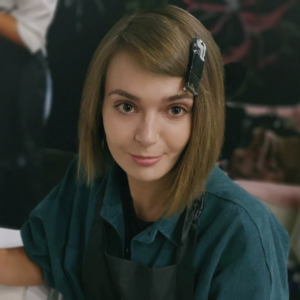The author of this story clearly hadn’t strained themselves with the details. The lab where the virus had escaped was an amalgamation of every lab ever conceived — sterile white walls, chrome-plated equipment, cold fluorescent lights. Corpses of humans and animals scattered on the floor, dried pools of blood, traces of catastrophe.
The AI controlling the lab’s systems spoke in an even, colorless voice.
“Confirmed. The individual you retrieved possesses antibodies to the virus.”
“Well, that’s that,” Makishima said. “Start synthesizing the vaccine.”
L was in the adjacent room, lying inside a cylindrical pod — something like an MRI machine.
“Would you like to say your goodbyes?” the AI inquired, with the same indifferent tone.
“What? I—what?”
“When the necessary brain tissue has been extracted for study, the subject will expire.”
...Excuse me? Hold on. That wasn’t the deal.
An hour ago, Makishima had been so overwhelmed with joy he thought he might lose his mind. He wasn’t ready for the ground to be yanked out from under him like this.
He had spent all this time, all these months searching, only for L to just die? For Makishima to be left alone again?
The only response he could come up with was an utterly stupid question:
“Are you sure?”
“Absolutely. The operation has a one hundred percent fatality rate.”
Well.
He supposed that was only fair. Saving the world from a zombie apocalypse and expecting all the main characters to survive — that would be too much.
Syrupy, unearned happy endings were for cowards. He’d even thought that himself, not too long ago.
No big deal.
L wouldn’t die, not really. He’d just return to the library. And Makishima would, too.
...Wouldn’t he?
“I’m initiating the procedure,” the computer announced. Makishima heard the hum of that same tube, the one that looked like an MRI machine.
No, he had to come back. Because once the vaccine was created, the story would finally have its ending… right?
He remembered all too well how empty and terrifying the city had been, full of corpses and zombies, while he was alone. The long weeks and months on Tokyo Skytree, the single flicker of hope that had kept him going — only to deceive him over and over again. What would become of him when even that flicker was gone? Probably, all that would be left was to sit and wait, hoping for the mercy of insanity.
“Cancel the procedure,” he said.
He could almost hear the digital gears grinding, ones and zeroes scraping together in the processor as it tried to process the command. A second later, the computer responded:
“Explanation required.”
Makishima only shrugged and walked toward the operating room doors.
“You are behaving irrationally given the circumstances. I apologize, but I will have to lock the operating room.”
Makishima frantically tapped at the keyboard, trying to override the lock.
“If you continue interfering with the procedure,” the computer said, “I will be forced to—”
“Oh, shut up,” Makishima snapped. He grabbed L’s shotgun, which had been leaning against the wall, and fired several shots at the computer’s main system unit.
The humming stopped. The lights flickered, then went out.
A minute later, L poked his head out of the operating room.
“What just happened?”
“The computer was evil,” Makishima said vaguely.
The shotgun in his hands trembled slightly.
“Hey, what’s up with you?” L asked, puzzled. “You look like hell.”
Makishima had no idea how to explain what had just happened. L was supposed to stay in that lab — that much was certain. This was supposed to be a story about saving the world. But now? What was it now? A story about selfishness? And more importantly — what now? He had no idea what to do with a story that had veered so far off its intended path, but he was sure of one thing: nothing good would come of it.
He wanted to delay the moment when L would ask, So what do we do now? — because Makishima had no answer.
L watched him, concerned. To change the subject, Makishima asked, “How did you even get into the city from Odaiba when you saved me from the zombies? The bridge was blown up.”
“I blew it up myself — to keep the infected from crossing over. But the upper part of the bridge was still intact. I took the Yurikamome line. You showed up right on time, almost at Shimbashi Station. The trains still run like usual — zombies are too dumb to step onto them.”
“The Yurikamome…?”
Judging by L’s sudden grin, the complete and utter confusion on Makishima’s face was amusing.
“No wonder the future sucked for you,” L said. “You didn’t even have Odaiba over there, did you?”
What did he mean, didn’t have? Makishima knew something about Odaiba, albeit vaguely — once a military outpost in the bay, later a landfill for Tokyo’s ever-growing waste, and then eventually, the island had become part of the city…
“Come on,” L said. “I’ll show you Odaiba.”
“…It was the most popular leisure spot in Tokyo — especially for families, tourists, and couples on dates. The Yurikamome line is driverless, controlled entirely by computers. People thought it was cool — like the magic started before you even set foot on the island.”
“And you lived here for all three months?”
“Yep. You can take off that hazmat suit, by the way. No zombies here. The few that showed up, I took care of — and even cleaned up the bodies.”
Makishima pulled off his mask, and immediately, a gust of wind from the bay hit his face. It carried the scent of seaweed and fish. A strange feeling. For the past three months, he had only seen the world through a protective suit or through the thick glass of the Skytree — "through a glass, darkly."
They strolled along Odaiba’s small beach, then turned toward the buildings. The entire island was essentially one massive entertainment complex — museums, malls, movie theaters. There weren’t many structures, but all of them looked as bizarre and pseudo-futuristic as the Fuji TV building — the one with the giant sphere in a metal grid, where L had sent his SOS signal.
“There’s a great robot exhibit at Miraikan, the Museum of the Future — wanna check it out?” L asked. “Most of it still works. You can even control some of them yourself…”
Robots didn’t interest Makishima. There had been no shortage of those in his own world. Instead, L dragged him to the International Exhibition Center, where, as it turned out, Comiket had been taking place when the outbreak started.
“The biggest convention in the world for comics, games, doujinshi, cosplay, all that stuff.”
This remark led to a lengthy explanation from L, and then to a series of bizarre sights at Comiket itself — sights that left Makishima so bewildered that at first, he didn’t even know how to comment.
It wasn’t until later, when they had already left the convention and wandered far from the Exhibition Center, that he finally reacted.
In the park, completely unprepared for what he saw, Makishima stopped dead in his tracks in front of a ten-story-tall battle robot model.
And declared, “I’m absolutely certain that nothing like this ever existed in my world. There must’ve been a different Odaiba there.”
“What, you got something against Gundams?” L asked.
Makishima had nothing specifically against Gundams. It was just that everything about Odaiba felt absurd — like some kind of metaphor for escapism in the worst possible sense. He tried to explain:
“I can’t believe there were that many people who were seriously into this kind of weird, ridiculous stuff. Spending their lives drawing fan comics, sewing stupid costumes, throwing away their education and careers because they were obsessed with fictional characters… Shutting themselves off from the real world like this — it’s basically the same as giving up on life.”
L snorted. “Look who is talking!”
Makishima frowned. “Wait, you actually like this nonsense?”
“And what if I did?” L shot back, suddenly sharp.
Makishima felt… awkward. But then L shook his head. “No… I was never into anime or anything. But maybe, in the end, it doesn’t really matter what entertains us. Whether it’s investigations or drawing doujinshi about battle robots… It’s normal to have weird interests.”
Then L suggested they go to the arcade.
“What’s the point?” Makishima asked, puzzled. “There’s no security, everything’s allowed. You could just shake the claw machine and take whatever you want.”
“That,” L said in a lecturing tone, “is precisely the most pointless thing you could do. Aren’t you even a little curious? I think if you calculate the angle, speed, and grip strength just right — and I am, of course, smart enough to do that — winning a prize should be easy.”
“That’s nonsense,” Makishima said.
For the next hour, they competed, trying to fish out stuffed toys. In the end, Makishima won — he was the first to make the machine surrender a soft, long-eared creature. It was utterly ridiculous, but oddly satisfying; he handed his prize to L with a triumphant smirk. L, not looking the least bit disappointed in his loss, tucked the plush under his arm and mused aloud:
“Let’s see… Where else do people usually go here? We could take pictures in a purikura booth, but that might be a bit much — we’re not gyaru schoolgirls, after all. Let’s ride the Ferris wheel instead.”
On their way to the towering Ferris wheel with its multicolored cabins, Makishima spotted yet another sign of the island’s utter madness — a metro station named Tokyo Teleport. But after surviving Comiket, his mind had built up some resistance, and he let it slide without comment.
From the top of the wheel, the view was breathtaking. The sea, the Rainbow Bridge, the intricate layers of highway interchanges, and the skyscrapers of Tokyo, bathed in the golden light of the setting sun. This strange, endless day of unclear genre was finally drawing to a close.
Looking out over it all, it was easy to pretend the apocalypse had never happened — that the figures in the distance were ordinary, smiling people instead of monsters, that the air was safe to breathe without a hazmat mask. But in reality…
L, sitting across from him in the cabin, pulled him out of his thoughts.
“Why do you look so gloomy?”
Makishima sighed and finally admitted, “The computer in the lab… There was nothing wrong with it, actually. I just… got scared of being alone again, and…”
“I figured,” L said thoughtfully. “You’ve changed, you know. Since the first time I saw you… It’s almost like you’re a different person.”
“Really?” Makishima frowned.
“But only at first glance,” L added. “In truth, you’re even more you than before.”
Makishima gave up trying to untangle that and said, “Honestly, I have no idea what to do now. We’re not making a vaccine, we’re not saving the world from the virus…”
L laughed.
“Have you seen yourself? What kind of world savior would you make?”
“Still, this was supposed to be a story about saving the world. And now it’s about… what? Instead of stopping the zombie apocalypse, we’re playing claw machines and riding Ferris wheels. Doesn’t that seem… meaningless to you?”
“You and your obsession with meaning…” L scoffed. “Of all the things to worry about. Who cares what happens to the story? We can always leave it — one way or another. You know that, right? We are our characters, but we’re also more than them. Even if we’re part of the story, we’re more than it.”
Something about those words struck Makishima deeply, even though, logically, they weren’t new. It was like walking down a long dark corridor toward a light — knowing you’d reach the sun, but still surprised by its warmth when you finally stepped into it. We’re more than the story. More than any story.
And that was when it all ended — suddenly, and yet, in some way, exactly as expected.
Every other time, they had transitioned into the library without noticing. But this time, Makishima saw it happen — the Tokyo Bay around them, glowing with the last light of sunset, slowly, almost reluctantly, fading and dissolving.
The Ferris wheel’s cabin was gone.
They were sitting on the floor of a dimly lit room in their Library of Babel, surrounded by books scattered across the carpet like a witch’s circle.











Comments (0)
See all